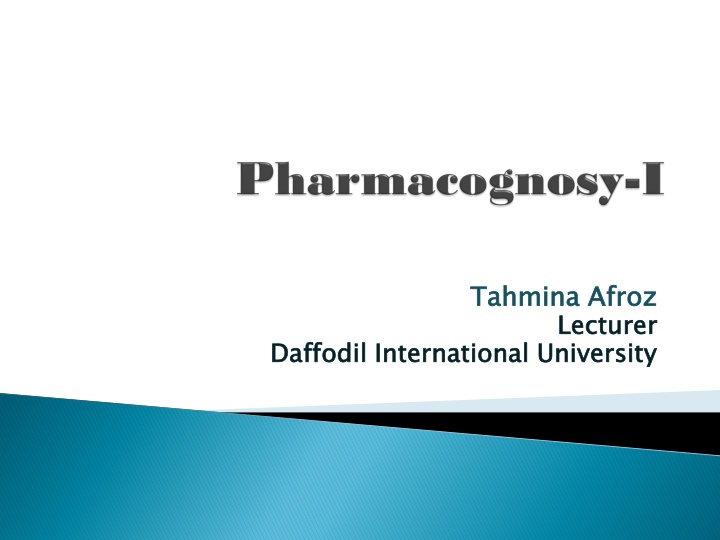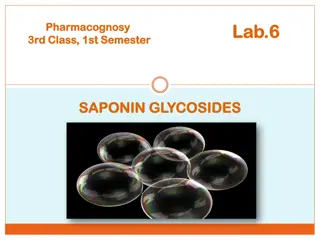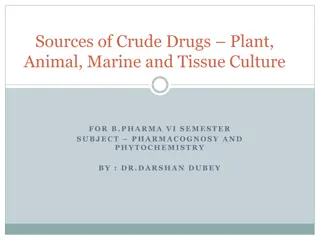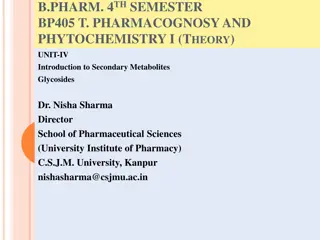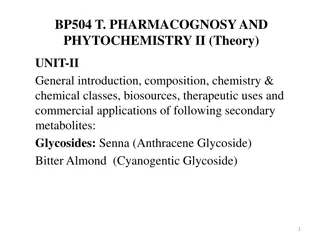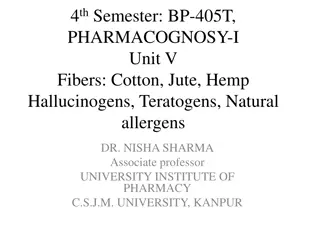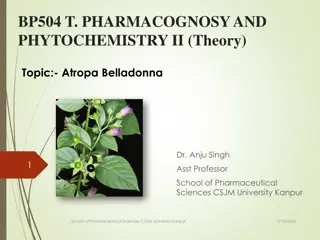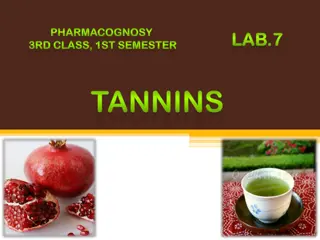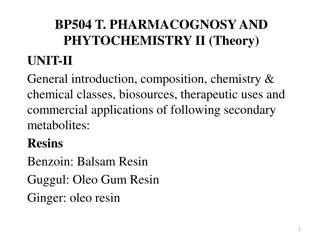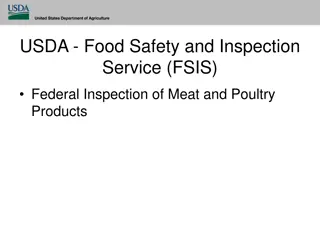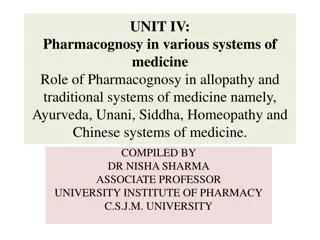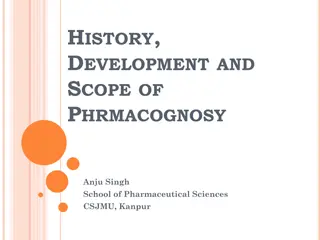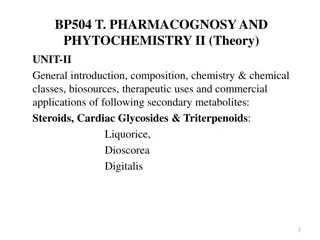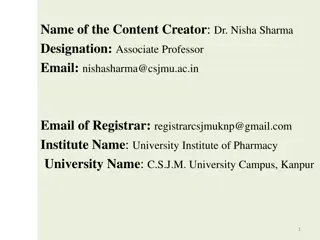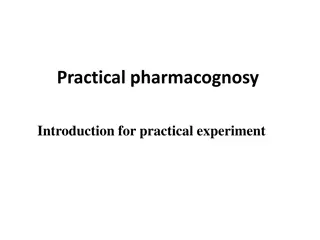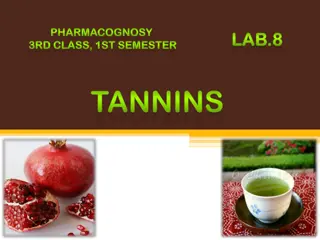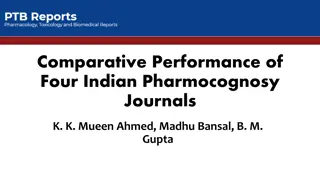Overview of Pharmacognosy and Natural Products
Pharmacognosy is the study of medicinal drugs derived from natural sources, focusing on the properties and origins of crude drugs like plants and animals. The term was coined in 1815, emphasizing knowledge of drugs' physical, chemical, and biological properties. It is associated with various branches such as botany, ethnobotany, and herbal medicine. Additionally, the terminology of drugs and traditional medicine are discussed, highlighting the importance of natural products in pharmacognosy.
Download Presentation

Please find below an Image/Link to download the presentation.
The content on the website is provided AS IS for your information and personal use only. It may not be sold, licensed, or shared on other websites without obtaining consent from the author.If you encounter any issues during the download, it is possible that the publisher has removed the file from their server.
You are allowed to download the files provided on this website for personal or commercial use, subject to the condition that they are used lawfully. All files are the property of their respective owners.
The content on the website is provided AS IS for your information and personal use only. It may not be sold, licensed, or shared on other websites without obtaining consent from the author.
E N D
Presentation Transcript
Tahmina Tahmina Afroz Lecturer Afroz Lecturer Daffodil International University Daffodil International University
Pharmacognosy is the study of medicinal drugs derived from plants or other natural sources. Or Pharmacognosy is a scientific discipline ,which is primarily concerned with the study of crude drugs obtained from natural sources, such as plants, animals and minerals. Or Pharmacognosy is an important branch of pharmacy, which deals with the scientific study of the structural, physical, chemical , biochemical and sensory characters of crude drugs and related substances of plant, animal and mineral origin.
The term Pharmacognosy was first coined and used by C.A Seydler in 1815. It was first derived from two greek words: pharmakon ,which means a drug and gnosis which means knowledge , thus the literal meaning of pharmacognosy is : knowledge of drug . The American Society of Pharmacognosy defines pharmacognosy as "the study of the physical, chemical, biochemical and biological properties of drugs, drug substances or potential drugs or drug substances of natural origin as well as the search for new drugs from natural sources."
Pharmacognosy is related to differences branches like o Botany o Ethnobotany o Marine biology o Microbiology o Herbal medicine o Chemistry o Pharmacology o Pharmaceutics
Terminology Drugs: The terms drug refers to any article, weather natural or synthetic having therapeutic and medicinal properties and used in the diagnosis , cure ,treatment or prevention of diseases in man and other animals. Crude drugs: Crude drugs are natural substances of plant, animal or mineral origin, which possess therapeutic properties and pharmacological actions and which have undergone no treatment other than collection and drying.
Traditional medicine: Traditional Medicine is the systems of medicine based on cultural beliefs and practices handed down from generation to generation. According to the world health organization (WHO) Traditional medicine is the sum total of all knowledge and practice, used in the diagnosis , prevention and elimination of physical mental or social imbalance.
Natural products: they can be 1. Entire organism (plant, animal, organism) 2.Part of an organism (a leaf or flower of a plant, an isolated gland or other organ of an animal) 3. An extract or an exudate of an organism 4. Isolated pure compounds Value of natural products Compounds from natural sources play four significant roles in modern medicine: 1. They provide a number of extremely useful drugs that are difficult, to produce commercially by synthetic means 2. Natural sources also supply basic compounds that may be modified slightly to render them more effective or less toxic
3. Their utility as prototypes or models for synthetic drugs possessing physiologic activities similar to the originals 4. Some natural products contain compounds that demonstrate little or no activity themselves but which can be modified by chemical or biological methods to produce potent drugs not easily obtained by other methods Baccatin III Taxol
Medical ethnobotany: the study of the traditional use of plants for medicinal purposes. Ethnopharmacology: the study of the pharmacological qualities of traditional medicinal substances. Study of phytotherapy: the medicinal use of plant extracts Phytochemistry, the study of chemicals derived from plants (including the identification of new drug candidates derived from plant sources). Zoopharmacognosy: the process by which animals self- medicate, by selecting and using plants, soils, and insects to treat and prevent disease. Marine pharmacognosy: the study of chemicals derived from marine organisms.
The Pharmacognosy has played an important role in the development of various departments of the science. Pharmacognosy gives a sound knowledge of the vegetable drugs under botany and animal drugs under zoology. It also includes plant taxonomy, plant breeding, plant pathology, plant genetics and by this knowledge one can improve the cultivation methods of both medicinal and aromatic plants.
Nowadays phytochemistry has undergone a significant improvement. This includes variety of substances that are accumulated by plants and synthesized by plants. A vital contribution to the advancement of physical and natural science: This is done by advanced technologies of cultivation, purification, identification characterization of pharmaceuticals from nature. Concept of biochemistry and chemical engineering help in the improvement of collection , processing and storage technologies of pharmaceuticals. It also gives a knowledge of chemotaxonomy, biogenic pathway for the formation of acute ingredients.
Currently It is focusing on identification of drugs, including the isolation of active principles, and more recently, the investigation of biological activity. Pharmacognosy has played a pivotal role in the discovery and development of new drugs and therapies, and has been continuing to do so even today. But is has been neglected by modern Pharmacy trend. .
One of the best examples of the usefulness of not neglecting indigenous herbal remedies is Artemisia annua (common name: quinghaosu), which has long been used in China for the treatment of intermittent fever or malaria. Extracts from this plant were studied in the West from the 1980s onward, resulting in the development of a new class of effective antimalarials, the artemisinins.
Pharmacognosy includes a study of natural drugs and its chemical constituents.(eg: Stramonium and its chemical constituents, Rauwolfia root and its alkaloids, Reserpine and rescinnamine etc) Pharmaceutical necessities or excipients(eg: colouring and flavouring agents, emulsifying and suspending agents, diluents etc.)also studied in pharmacognosy. Medical and pharmaceutical aids (eg: Surgical dressing, anesthetic aids ,filtering agents ,wax fixed oils etc) are discussed in pharmacognosy.
Beverages like tea and coffee are also studied in pharmacognosy because of caffeine content. Spices and condiments are included in the pharmacognosy.(eg: Cinnamon bark , Cardamon fruit, cumin ,mustard seed, clove etc ) Studies of a variety of commercial and medicinal products also included in pharmacognosy. (eg:Pesticides, enzymes, vitamines antibiotic etc.)
To know the collection , identification , preparation and extraction of drugs ,knowledge of pharmacognosy is important. To know the active principles of drugs as chemicals pharmacognosy knowledge is important. To know the mode of drug action pharmacognosy is important.
Drug activity can be modified or improved by pharmaceutical chemist if he possesses a good knowledge in pharmacognosy For the formulation and actual preparation of drugs, knowledge of pharmacognosy is important. Price of pharmaceutical product is influenced by the methods of collection ,curing and assaying of the ingredients which are delt with pharmacognosy.
THANK YOU THANK YOU
